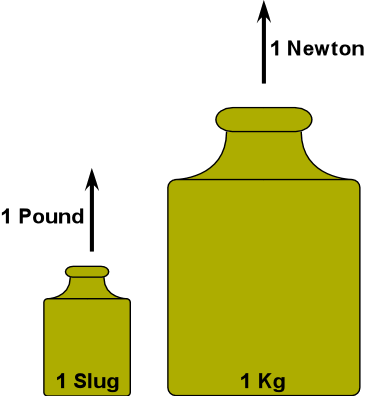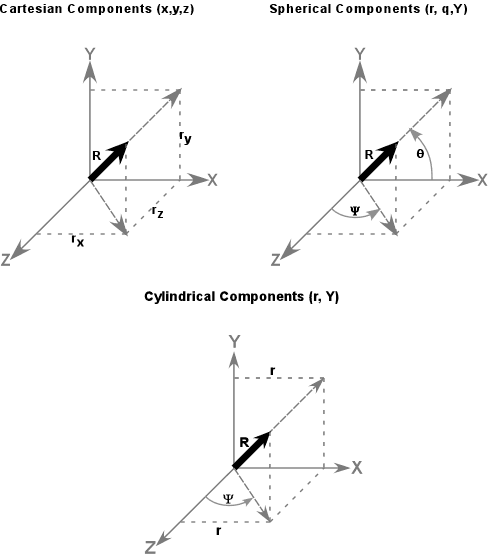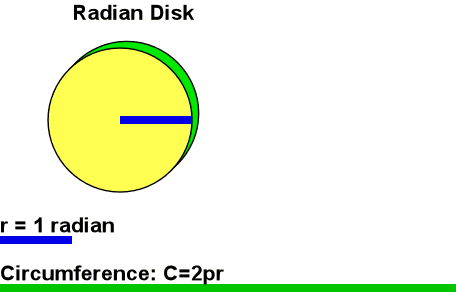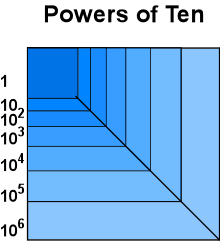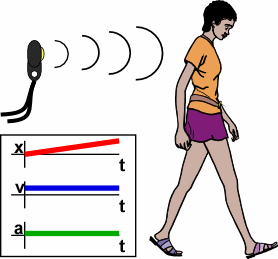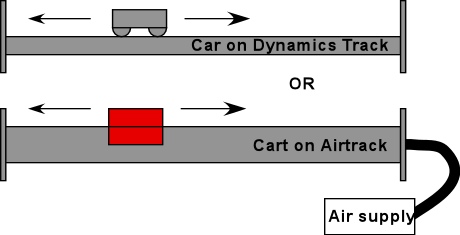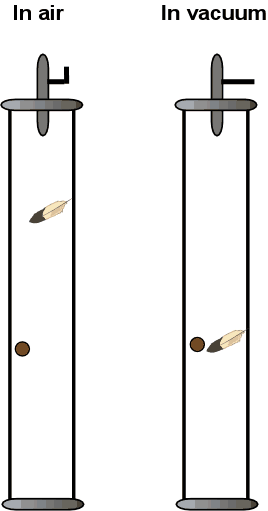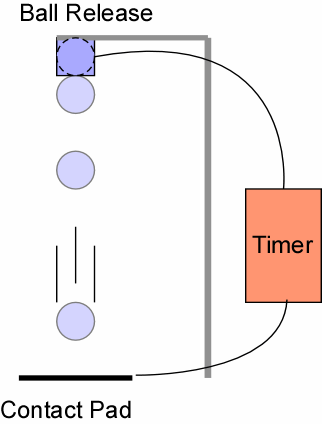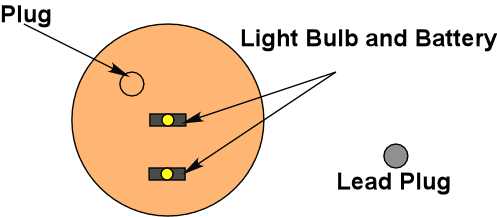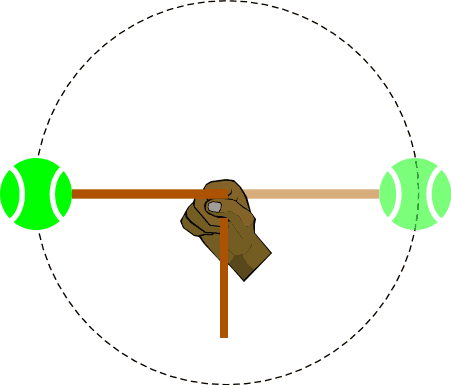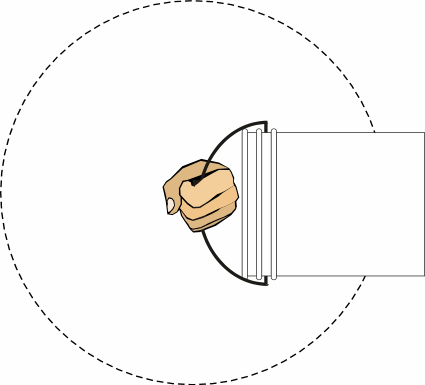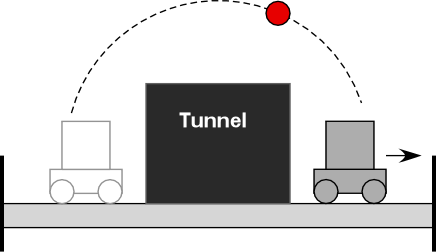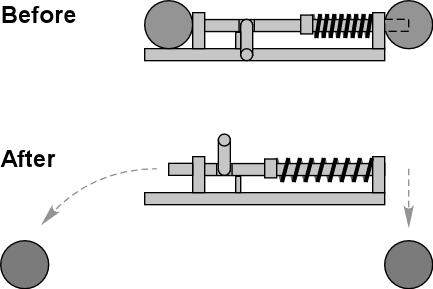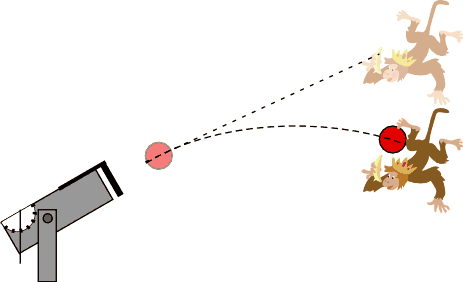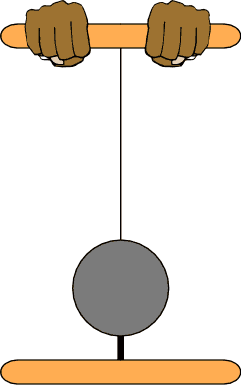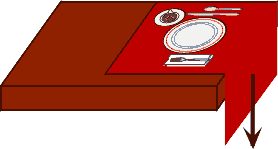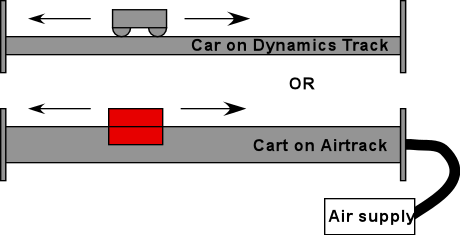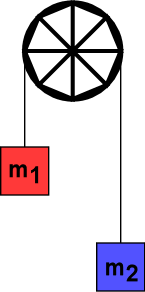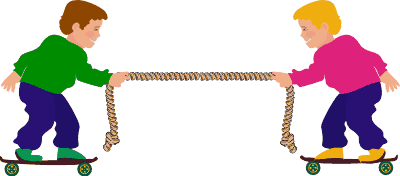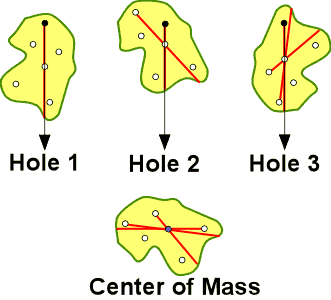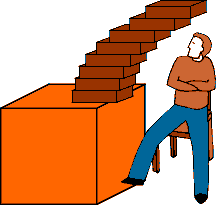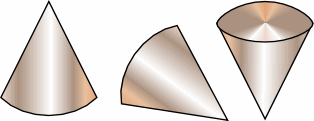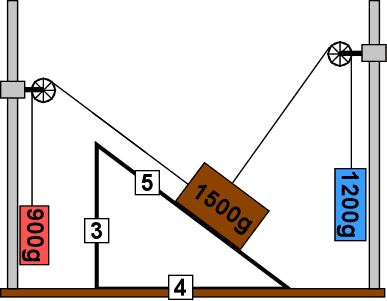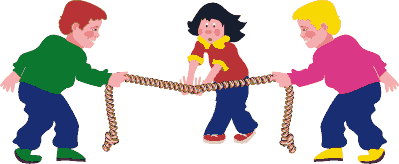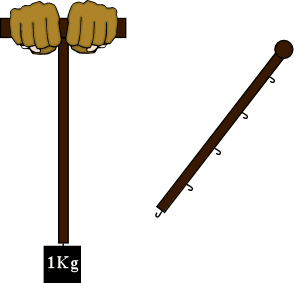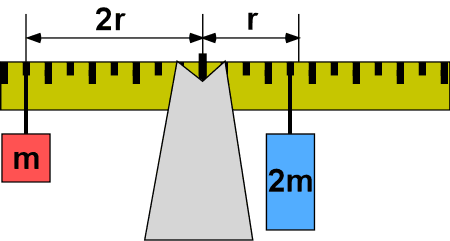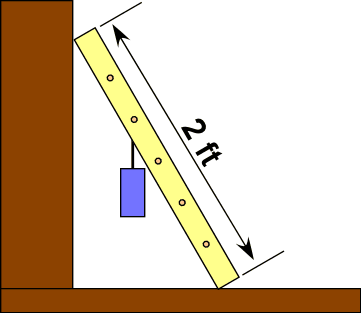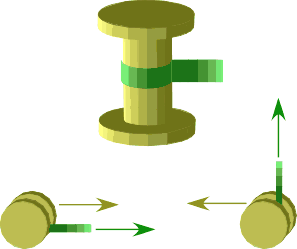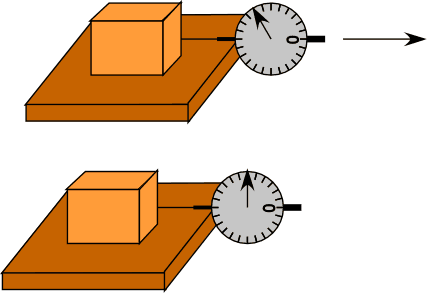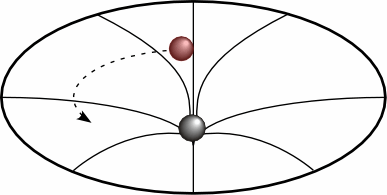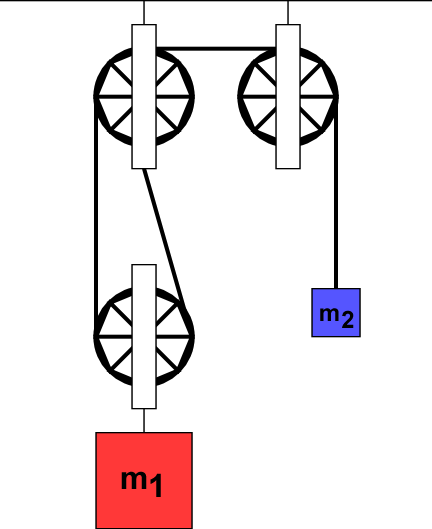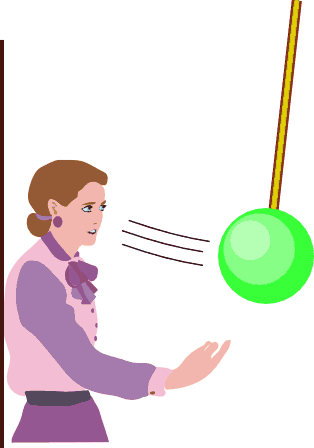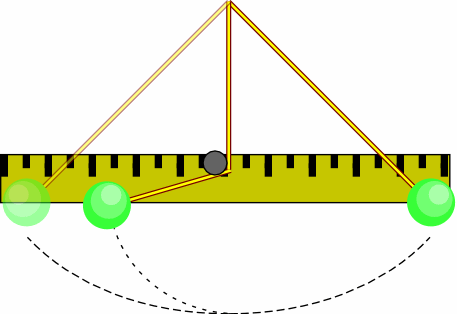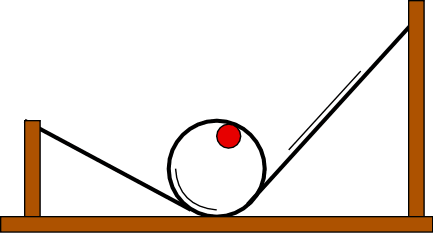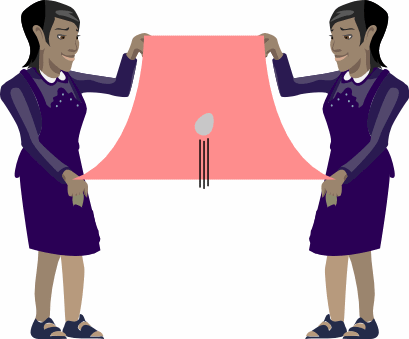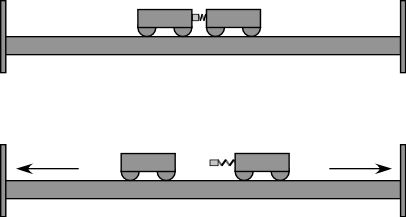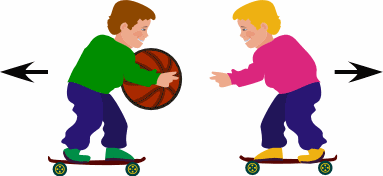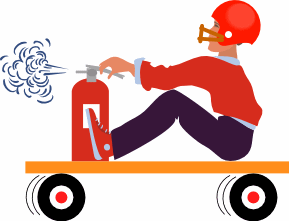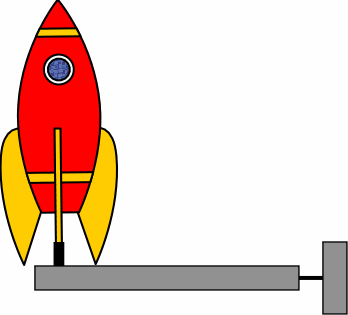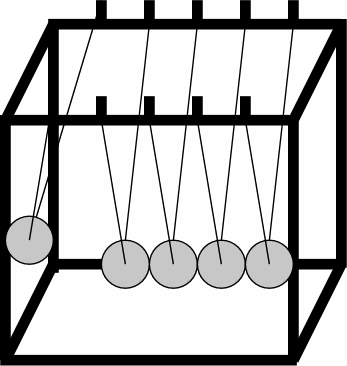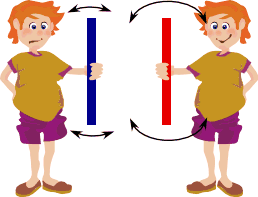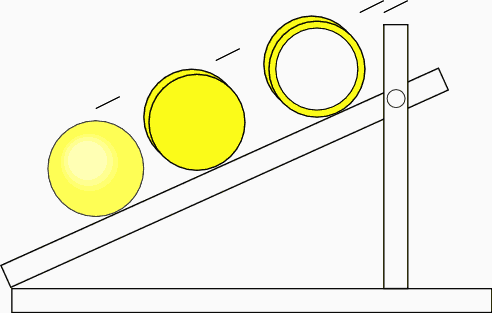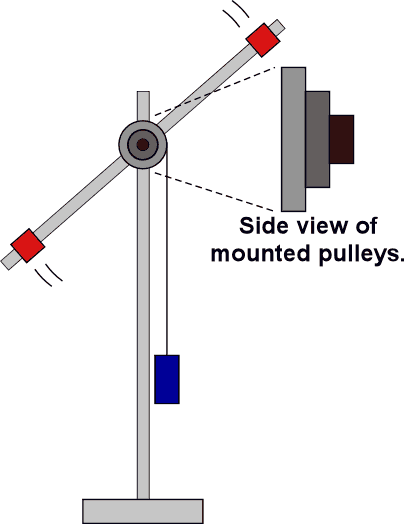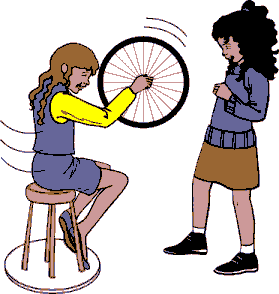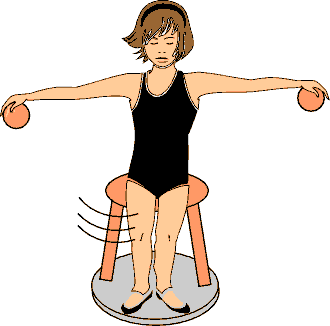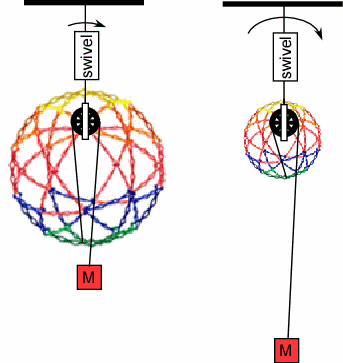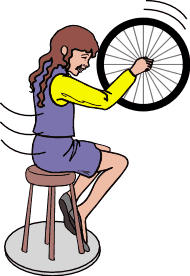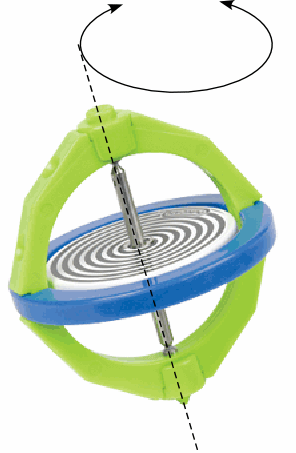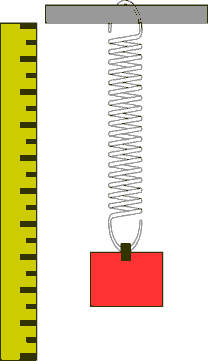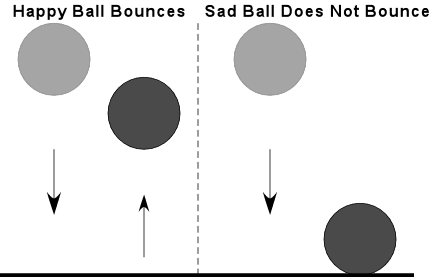PIRA
200
Mechanics
|
1A10.20 |
MEASUREMENT |
|
|
Basic Units |
||
Standards of Mass |
||
|
Disc 01-01 |
||
|
Show students 1kg and 1 lb. masses to illustrate their size. Have students lift both to illustrate their weights. A 1 slug mass can also be shown and lifted. |
||
|
1A10.35 |
MEASUREMENT |
|
|
Basic Units |
||
Meter Stick |
||
|
Disc 01-01 |
||
|
Show the relatvie length of the meter and the yard. The standard yard ad meter are also available. A globe can be used to ttalk about the oricinal definition of the kilometer: the line from the pole to the equator throug Paris was 10,000 kilometers. |
||
|
1A40.10 |
MEASUREMENT |
|
|
Basic Units |
||
Vectors |
||
|
|
||
|
The angle between the vector and any axis is not the same as the angle between the axis and the projection of the vector onto a place defined by two axis. |
||
|
1A50.10 |
MEASUREMENT |
|
|
Math Topics |
||
Radian |
||
|
Disc 05-12 |
||
|
Show a string with the length of one radius. Mark off the radii on the circumference of the large white board disk. |
||
|
1A60.10 |
MEASUREMENT |
|
|
Scaling |
||
Powers of Ten |
||
|
|
||
|
There are three versions of the film:
The video disk:
For those that haven't seen this film, it has a picture of a couple having a picnic in a park and the camera starts with a 1 meter frame from 1 meter off the ground, then steps back to a 10 meter frame, then 100 meters frame and continues to the furthest reaches of space. It also goes in the opposite direction into the subatomic regions on the hand of one of the two people in the park. Great film in teaching the significance of using the powers of ten in our world. |
||
|
1C10.05 |
MOTION IN 1D |
|
|
Velocity, Position and Acceleration |
||
Ultrasonic Ranger and Student |
||
|
|
||
|
A student walks toward and away from a sonic ranger. The computer displays graphs of position, velocity and acceleration Vs. time. |
||
|
1C10.20 |
MOTION IN 1D |
|
|
Velocity |
||
|
||
|
|
||
|
Demonstrate the principle of velocities with the aid of the If available, you can also do this with an Airtrack. |
||
|
1C20.10 |
MOTION IN 1D |
|
|
Uniform Acceleration |
||
Penny and Feather |
||
|
Disc 01-04 |
||
|
Shake the penny and feather to one end of the air filled tube. Quickly bring the tube to a vertical position and watch the objects fall. The penny will fall faster. Connect the tube to the pump and pump the air out. Close the valve and disconnect the tube from the pump and repeat the inversion as before. The penny and feather will fall at the same rate. The tube is about 150cm long. |
||
|
1C30.10 |
MOTION IN 1D |
|
|
Measuring g |
||
|
||
|
|
||
|
The ball can be released from four different heights, 0.5m, 1m, 1.5m and 2m. Place the ball between the contacts. Slide the rod to the left and tighten set screw to hold ball in place. Tap the contact pad and reset the timer, in that order. Loosen set screw to release ball. The timer will start. The timer stops when the ball strikes the pad. Move ball release to a new position and repeat. Gives g to within 5%. |
||
|
1D40.10 |
MOTION IN 2D |
|
|
Motion and the Center of Mass |
||
Throw Objects |
||
|
Disc 03-21 |
||
|
Screw a light bulb into the center and toss to someone. The light bulb shows the center of mass. Change the center of mass of the disc by exchanging the foam plug for a lead weighted plug. Move the bulb to the new center of mass (off center). Hold the disc near the center of mass to toss. Don't worry about breaking the light bulb. |
||
|
1D50.10 |
MOTION IN 2D |
|
|
Central Forces |
||
Ball on a String |
||
|
|
||
|
A ball tried to a string. Twirl in a vertical direction so students can see the path of the ball. |
||
|
1D50.40 |
MOTION IN 2D |
|
|
Central Forces |
||
Pail of Water, Pail of Nails |
||
|
Disc 05-21 |
||
|
Swing a pail filled with water in a large vertical circle just fast enough so that the water doesn't spill out. The pail may also be filled with nails. They can be heard dropping away and hitting the pail at the top of the swing, if swung just right. |
||
|
1D60.10 |
MOTION IN 2D |
|
|
Projectile Motion |
||
Howitzer and Tunnel |
||
|
Disc 02-03 |
||
|
Set the trigger on the cart. Give the cart a strong push towards the tunnel. If the ball hits the tunnel, you've not pushed the cart hard enough. Track is 10 feet long. |
||
|
1D60.20 |
MOTION IN 2D |
|
|
Projectile Motion |
||
Simultaneous Fall |
||
|
|
||
|
A spring loaded device drops one ball and projects the other horizontally.
|
||
|
1D60.30 |
MOTION IN 2D |
|
|
Projectile Motion |
||
Monkey and Hunter |
||
|
Disc 02-02 |
||
|
Aim the cannon at the monkey when the monkey is held up high. When the ball leaves the cannon, the monkey should drop. The ball will hit the monkey since they fall at the same rate. Lower velocity means each falls a greater distance before hitting. |
||
|
1E10.20 |
RELATIVE MOTION |
|
|
Moving Reference Frames |
||
Frames of Reference Film |
||
|
|
||
|
The classic film available on video disc or DVD permits use of selective parts.
|
||
|
1F20.10 |
|
|
|
Inertia of Rest |
||
Inertia Ball |
||
|
Disc 02-13 |
||
|
Pull up slowly to overcome the inertia of the heavy ball and break the bottom string. Pull up fast to break the top string. Have the students guess beforehand which string will break. |
||
|
1F20.30 |
|
|
|
Inertia of Rest |
||
Tablecloth Pull |
||
|
|
||
|
Pull the tablecloth out from under a place setting.
|
||
|
1F30.10 |
|
|
|
Inertia of Motion |
||
Persistence of Motion |
||
|
|
||
|
Level the track. Give the cart a push and watch it bounce end to end along the track. The air track works better, but is noisier. |
||
|
1G10.10 |
|
|
|
Force, Mass and Acceleration |
||
Accelerating Air / Dynamics Cart |
||
|
|
||
|
An air track cart is timed while pulled by a mass on a string over a pulley. This can also be done with the
|
||
|
1G10.40 |
|
|
|
Force, Mass and Acceleration |
||
Atwood's Machine |
||
|
Disc 01-16 |
||
|
Place 1kg on each side. Add a 2g mass to the high side. Measure the distance the mass falls and the time it takes to fall this distance. |
||
|
1H10.10 |
|
|
|
Action and Reaction |
||
Push Me Pull Me Carts |
||
|
|
||
|
Have two students stand on the carts (or skateboards) and grab the ends of the rope. Have only one student pull at a time and observe that they both move. Use a long stick for pushing, or push off of each other's hands. |
||
|
1J10.10 |
STATICS OF RIGID BODIES |
|
|
|
||
Map of State |
||
|
Disc 03-20 |
||
|
Hang map of your state on a peg through the desired hole. Hang a plumb bob in front. Mark plump line with marker. Repeat with other holes. Where the lines cross is the center of gravity. |
||
|
1J11.20 |
STATICS OF RIGID BODIES |
|
|
Exceeding Center of Gravity |
||
|
||
|
AJP 23(4), 240; AJP 41(5), 715 |
||
|
A set of eight blocks or books is stacked so the top block is completely over the edge of the table. Step lengths go as L/2n. |
||
|
1J20.10 |
STATICS OF RIGID BODIES |
|
|
Stable, Unstable, and Neutral Equilibrium |
||
Bowling Ball Stability |
||
|
|
||
|
A bowling ball is placed in, on, and along side a large Plexiglas hemisphere. |
||
|
1J20.11 |
STATICS OF RIGID BODIES |
|
|
Stable, Unstable, and Neutral Equilibrium |
||
Balance the Cone |
||
|
|
||
|
A cone can show stable, unstable, and neutral equilibrium; a sphere shows only neutral equilibrium. |
||
|
1J30.10 |
STATICS OF RIGID BODIES |
|
|
Resolution of Forces |
||
Suspended Block |
||
|
Disc 04-03 |
||
|
The sides of the triangle are in the ration of 3:4:5. The 1500g block rests on a stop which can be removed after the force parallel to the incline is balanced. The block will be suspended in the same configuration as when on the incline. The masses to balance the perpendicular and parallel forces are 1200g and 900g, respectively. |
||
|
1J30.25 |
STATICS OF RIGID BODIES |
|
|
Resolution of Forces |
||
Rope and Three Students |
||
|
|
||
|
A single student can easily deflect a rope held very taut by two other students. |
||
|
1J40.10 |
STATICS OF RIGID BODIES |
|
|
Static Torque |
||
Grip Bar |
||
|
Disc 04-10 |
||
|
A 1kg mass can be suspended from a bar at different places. The further from the handle grip, the harder it is to keep the stick level or to rotate the stick upwards. |
||
|
1J40.20 |
STATICS OF RIGID BODIES |
|
|
Static Torque |
||
Torque Beam |
||
|
Disc 04-14 |
||
|
Different combinations of mass at different distances from the pivot can be used to show torques in equilibrium. Distances from the pivot are integer multiples: r, 2r, 3r, 4r. Individual masses are identical. |
||
|
1K10.20 |
APPLICATIONS
OF |
|
|
Dynamic Torque |
||
Ladder Against a Wall |
||
|
Disc 04-18 |
||
|
A model ladder leans against a heavy wooden box and a mass is hung from a rung. Move the mass higher and higher or adjust the angle smaller and smaller until the ladder slips. Different materials can be used for the surfaces to show different static frictions. |
||
|
1K10.30 |
APPLICATIONS
OF |
|
|
Dynamic Torque |
||
Walking the Spool |
||
|
Disc 06-07 |
||
|
Pull the rope that is wound around the spool. The angle between the rope and the table determines the direction the spool will roll. At some angle, the spool will not roll, but slide when you pull it. |
||
|
1K20.10 |
APPLICATIONS
OF |
|
|
Friction |
||
Friction Blocks - Surface Materials |
||
|
Disc 03-05 |
||
|
Measure static friction by noting the scale reading just before the block slides. Measure sliding friction by pulling the block at a constant speed. Change the surface materials and note the different frictions. |
||
|
1K20.30 |
APPLICATIONS
OF |
|
|
Friction |
||
Static vs. Sliding Friction |
||
|
|
||
|
Measure static friction by noting the scale reading just before the block slides. Measure sliding friction by pulling the block at a constant speed. Compare the two readings. |
||
|
1L10.10 |
GRAVITY |
|
|
Universal Gravitational Constant |
||
Cavendish Balance Video |
||
|
|
||
|
Ztek Company Multimedia for Physics |
||
|
1L20.10 |
GRAVITY |
|
|
Orbits |
||
Gravitational Wells |
||
|
|
||
|
A potential well made of a clothes basket and rubber sheet. Also large and small commercial models of 1/R cones. |
||
|
1M10.20 |
WORK AND ENERGY |
|
|
Work |
||
Pile Driver |
||
|
Disc 03-07 |
||
|
Raise the mass to the desired height and let it fall freely. If the mass is raised twice as high, the nail will be driven twice as deep. The mass is 4kg. A 16d nail has a mass of about 7g and a 10f has a mass of about 5g. The maximum distance the mass can fall is about 86cm. Option: Calculate the work needed to crush a soda can or drive a nail. |
||
|
1M20.10 |
WORK AND ENERGY |
|
|
Simple Machines |
||
Pulleys |
||
|
|
||
|
An assortment of large pulleys can be rigged several ways. |
||
|
1M40.10 |
WORK AND ENERGY |
|
|
Conservation of Energy |
||
Nose Basher |
||
|
Disc 03-14 |
||
|
Stand against the wall. Bring the bowling ball up to your nose or chin. Release the ball without giving it any initial velocity. Stand very still and wait for the return. |
||
|
1M40.15 |
WORK AND ENERGY |
|
|
Conservation of Energy |
||
Stopped Pendulum |
||
|
Disc 03-13 |
||
|
Raise the pendulum a certain height. It will travel to nearly the same height on the opposite side whether it is "stopped" or not. The meter stick serves as a reference for the height of the pendulum. |
||
|
1M40.20 |
WORK AND ENERGY |
|
|
Conservation of Energy |
||
Loop the
|
||
|
Disc 06-09 |
||
|
Release the ball near the top of the track. The energy loss makes the minimum height necessary to complete the loop significantly higher than the calculated value. |
||
|
1N10.20 |
LINEAR MOMENTUM AND COLLISIONS |
|
|
Impulse and Thrust |
||
Egg in a Sheet |
||
|
Disc 05-09 |
||
|
Have two students hold a sheet slightly draped. Toss an egg into the sheet. Remember to remove the egg before throwing another! |
||
|
1N20.20 |
LINEAR MOMENTUM AND COLLISIONS |
|
|
Conservation of Linear Momentum |
||
Spring Apart Carts |
||
|
Disc 02-19 |
||
|
Two carts are fixed together with a spring in between them. The trigger is tripped and the spring pushes the carts apart. Different masses in the carts give different exit velocities. |
||
|
1N21.10 |
LINEAR MOMENTUM AND COLLISIONS |
|
|
Mass and Momentum Transfer |
||
Carts and Medicine Ball |
||
|
|
||
|
Two people on roller carts throw a medicine ball to each other. |
||
|
1N22.10 |
LINEAR MOMENTUM AND COLLISIONS |
|
|
Rockets |
||
Fire Extinguisher Rocket |
||
|
Disc 02-24 |
||
|
Remove the expansion nozzle from a fire extinguisher and replace it with a length of pipe. Sit on a low-friction cart and face the nozzle away from you. Make sure the extinguisher is well braced and wear a crash helmet. |
||
|
1N22.20 |
LINEAR MOMENTUM AND COLLISIONS |
|
|
Rockets |
||
Water Rocket |
||
|
Disc 02-23 |
||
|
Fill the rocket 1/3 with water. Pump it a specific number of times (your specification) and launch the rocket (you will probably get wet). Repeat the launch with the rocket filled with air to show the difference in range. |
||
|
1N30.10 |
LINEAR MOMENTUM AND COLLISIONS |
|
|
Collisions in 1D |
||
Collision Balls |
||
|
Disc 05-01 |
||
|
One ball raised and let go on one end will give one ball launched out from the other. Try different numbers of balls. If it doesn't work well, there is probably an alignment problem. Make sure the threads are straight and the balls are in a perfect line. |
||
|
1Q10.10 |
ROTATIONAL DYNAMICS |
|
|
Moment of Inertia |
||
Inertia Wands and Two Students |
||
|
|
||
|
The two wands have the same mass, but have the mass distributed differently. One has the mass concentrated in the middle, the other has the mass concentrated at the ends. Have two students rotate them back and forth as fast as they can to see the difference. |
||
|
1Q10.30 |
ROTATIONAL DYNAMICS |
|
|
Moment of Inertia |
||
Ring, Disk, and Sphere Race |
||
|
Disc 06-04 |
||
|
Each item has the same diameter. After leveling the track from side to side, have the students predict which will win the race. Release them all at the same time and see which one gets to the bottom first. |
||
|
1Q20.10 |
ROTATIONAL DYNAMICS |
|
|
Rotational Energy |
||
Adjustable Angular Momentum |
||
|
Disc 06-01 |
||
|
The moment of inertia can be changed by sliding, the masses on the stick in or out. Three different pulley sizes offer three different torques. |
||
|
1Q30.10 |
ROTATIONAL DYNAMICS |
|
|
Transfer of Angular Momentum |
||
Passing the Wheel |
||
|
|
||
|
Tip the spinning tire half way and hand it to a student on a turntable. This student tips it another half way and hands it back. Repeat until the spinning student it turning to fast for the hand off. You can add or subtract from the angular momentum depending on which way you tip the wheel. |
||
|
1Q40.10 |
ROTATIONAL DYNAMICS |
|
|
Conservation of Angular Momentum |
||
Rotating Stool and Masses |
||
|
Disc 07-04 |
||
|
Start a student rotating on the platform with the masses close to their body. Watch the change in spin as the student moves the masses further away. |
||
|
1Q40.22 |
ROTATIONAL DYNAMICS |
|
|
Conservation of Angular Momentum |
||
Rotating Hoberman Sphere |
||
|
|
||
|
A Hoberman sphere mobile has a ball bearing fishing swivel added so that it can rotate easily. Start it rotating in the expanded position. Pull on the string to collapse the sphere and observe the change in rotation speed. |
||
|
1Q40.30 |
ROTATIONAL DYNAMICS |
|
|
Conservation of Angular Momentum |
||
Rotating Stool and Wheel |
||
|
Disc 07-06 |
||
|
A student rotating on the platform can tip a spinning wheel in order to spin. Tipping the wheel in the opposite direction spins the student the opposite direction. |
||
|
1Q50.50 |
ROTATIONAL DYNAMICS |
|
|
Gyros |
||
Precessing Gyro |
||
|
|
||
|
A high quality gyroscope with a counterweight is used to show the fundamental precession equation with fair precision. |
||
|
1R10.10 |
PROPERTIES OF MATTER |
|
|
Hooke's Law |
||
Stretching a Spring |
||
|
Disc 08-01 |
||
|
Mark the beginning and end positions of several different masses. Compare the end positions of masses that are multiples, such as double or triple. |
||
|
1R40.30 |
PROPERTIES OF MATTER |
|
|
Coefficient of Restitution |
||
Happy and Sad Balls |
||
|
|
||
|
Drop bounce and no-bounce balls. Measure the height the bouncing ball is dropped from, and the height it bounces to, and calculate the coefficient of restitution. The sad ball will not bounce as it is made from energy absorbing material.
|
||
